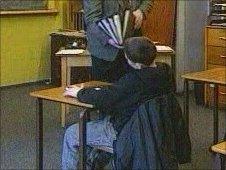Best and worst class behaviour
- Published

Teachers need to break up fights at times
It is a situation a teacher least wants to find themselves in and one for which few are properly prepared.
At 6ft 4in Paul (not his real name) is no shrinking violet and no easy target for a violent pupil.
But early in his 10-year teaching career, at a school in south London, he was hurled across a desk by a pupil.
"A large boy came to the office, threatening staff and demanding to use the phone," he said.
"He pushed me through some doors and we went over the desks. He was trying to hit me.
"I was worried about getting into trouble and I did not know it at the time but he had gone to the police about me. I only found out that the school had been investigating it afterwards. Luckily there were witnesses."
The incident was not an isolated one but it did not put Paul off teaching.
He is now an assistant head teacher just outside London.
He has had to restrain pupils - one of the areas the government wants to give clearer guidance on.
"About two years before I left my last school - also in south London - there was a fracas in the dining hall," he told the BBC News website.
"Two students were verbally abusing staff. I went to 'assist and support' and a boy started pushing me. I swept up his legs and pushed him to the ground and turned him on to his front until another member of staff came. There is usually strength in numbers.
"I am 6ft 4in, I am not small, but it took all my force.
"I was quite scared, especially because of the kind of community I was working in. Outside school the knife culture was happening.
"We were worried about repercussions when you left the building. Kids used to say 'Wait until after school' and 'Watch what is going to happen'."
He is critical of the leaders at that school, saying they did not take much action against violent or disruptive students because they were worried about law suits and thought a high rate of expulsions would make the school look bad.
"They used to send them home for three days then let them back," he says.
Loss of confidence
George Matthews organises training for teachers on managing behaviour, including restraining pupils, after many years as a deputy head teacher in a special residential school.
He says teachers have lost confidence and need to know they have the support of their leaders.
"Powers have not changed much in the past 10 years. It is about trying to take the anxiety away from people using these powers," he told the BBC News website.
"If you are a teacher and you are worried about your ability to control a class, you will lack the confidence needed to do it.
"This is about children being able to learn and teachers being able to teach. It is difficult for children to learn if lessons are being disrupted."
Mr Matthews, director of Team Teach, says teachers worry that if they use force to restrain a pupil, there will be a "knee-jerk reaction" and that they will be suspended, with people saying "there is no smoke without fire".
Most newly-qualified teachers he said, received a "very small amount" of training in behaviour management and "zero" on active physical support - and those were the situations teachers worried about.
Lessons learned
Teachers who stay in the system despite facing physical danger and the worst kinds of behaviour clearly have lessons to pass on.
As an assistant head at his present school, Paul can promote the philosophy he believes is the key to good behaviour and discipline - having a positive ethos or culture in a school.
"It's a simple philosophy of having high expectations for everyone and having a positive rewards culture," he says.
So uniform policy is enforced and those behaving badly are dealt with.
Senior members of staff regularly pop into classrooms, to check all is well, but also to build a rapport with the students.
"It's not just about Big Brother. We hope that it is cool to be clever, that pupils who are doing well get rewarded.

Some schools separate disruptive pupils until they start behaving
"If you watch Year 7s (eleven-year-olds), you can see them turning up very neat but, unless you watch your Year 10s, they will soon copy them and their shirts will be out. So we talk to them about setting a good example," he says.
"Some people say 'What do you expect with those children?' but the secret is to have an ethos of achievement for everyone."
That attention to detail and philosophy of high expectation is shared by Sir Alan Steer, who advised the last government on behaviour, and by staff at St Gregory's Catholic Science College in Kenton, Middlesex.
Both also agree that the secret of great behaviour in schools is great teaching.
St Gregory's is ranked outstanding for behaviour by England's schools inspectors Ofsted.
Schools Minister Nick Gibb chose to go there to launch his plans to "put head teachers and teachers back in control of the classroom" in England.
Head teacher Andrew Prindiville believes the measures being announced on Wednesday will be useful for some schools.
"These are not issues which affect us but for schools in challenging circumstances, the clarity will be useful," he told BBC News.
He puts the secret of his school's success with behaviour down to the priority it puts on learning and achievement.
"It's about our focus on learning, developing high aspirations and attention to detail," he said.
"If children are actively engaged in learning they can't be disruptive."
Active learning
New boy Mr Gibb sampled a little of the fast-paced, interactive learning going on at the school and asked pupils what they thought of behaviour in the school.
At St Gregory's, attention to detail comes out in uniforms worn neatly - with no over-sized ties or shirts hanging out.
Pupils told him their teachers picked them up on any untidy uniform and did not let them leave classes without straightening themselves up.
They don't seem to mind and even say it helps instil a sense of discipline.
Mr Gibb told them he liked the fact they stood for adults who walked into the room - and asked if they minded that.
No, that was fine too.
Bag searching - being made more permissible by the government - is not an issue here.
No mobile phones are allowed in school. Mr Prindiville believes the policy helps keep his pupils safe from would-be muggers.
"It's a message to muggers to leave my students alone - as they know they don't have phones."
In one in five secondaries in England, behaviour is classed as satisfactory or poor by Ofsted inspectors.
The majority of pupils Mr Gibb says, are well-behaved and want others to behave well too.
He stresses the measures being announced by the government will be there for schools if they want and need them - there will be be no compulsion.
With schools so starkly divided in terms of behaviour and culture, this seems sensible. Their impact will also vary greatly.
- Published7 July 2010